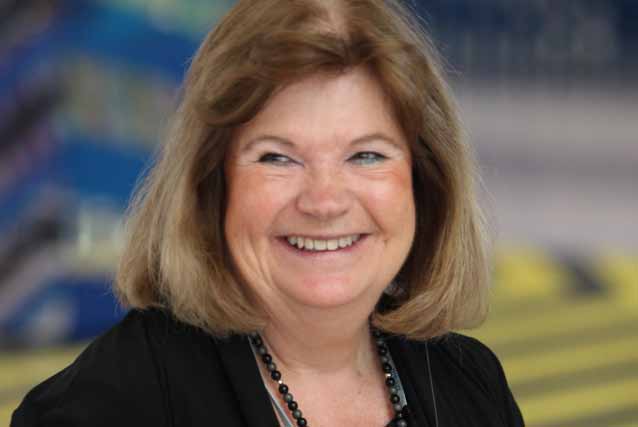 | | ▲Gunilla Lindberg. (Min-jae Kim/ANOC) |
|
A top Olympic official stated that preparations for the 2018 Winter Olympics were going well, but that a lot of work remained to ensure a successful Games.
The 2018 Olympics in PyeongChang will mark the 30th anniversary of the Seoul Olympics. This will allow the country to showcase again to the world its organizational ability as well as its cultural diversity, according to Gunilla Lindberg, an executive board member in the International Olympic Committee. “The sporting competition is just a small part of the whole event. It’s to bring the world here, to discover the Korean culture,” she told The Korea Herald in a recent interview.
Lindberg was in Seoul to attend the launch of the 2018 PyeongChang Olympics emblem.
The Swedish official, who led the 2018 Evaluation Commission, is now serving as chairwoman of the PyeongChang Coordination Commission. She is responsible for assisting and guiding as well as monitoring the progress of the PyeongChang Organizing Committee’s preparations until the 2018 Olympic Games. Lindberg is also serves as secretary-general for the Association of National Olympic Committees, which represents 204 Olympic committees around the globe.
The IOC Coordination Commission chairwoman said preparations for PyeongChang were in good shape. “It’s very important that you have the government support. I can feel that the new government is very much supportive,” she said. The city in Gangwon Province was awarded the 2018 Olympic Winter Games in July 2011. Seven of the 13 required competition venues have already been completed and the six remaining venues are under construction. Yet, there are also some challenges that hinder preparations. Notably, PyeongChang’s proposed alpine skiing venue in Jungbong has been facing criticism from environmental groups as the vast forested area is protected as a nature reserve. “Environment is one of the priorities for the IOC. It’s on the top of the list,” Lindberg said.
She said she believed local organizers were working closely with environmental groups. “They’re taking every measure to make it environmentally friendly,” she said, indicating that the IOC had no intention of relocating the venue. The venue for opening and closing ceremonies has been changed due to complicated access to and from the site. But the IOC official noted that changes were sometimes necessary to solve technical problems.
“There were small changes made, but for the better. But the concept as a whole is about the same,” she said, noting that PyeongChang’s key strength, a compact game plan, would remain unchanged. There is, however, criticism that hosting the Olympic Games is a lot like throwing the world’s largest and most expensive party. A study estimated that PyeongChang would spend $8 billion-$9 billion on Olympic venues, training and media centers, road repairs and new railways as well as new hotels and houses. Lindberg dismissed the criticism: “The investment is investment for the future.”
“After the Olympic Games, you’ll have new winter sports venues in Korea which will probably attract a lot of people. You’ll invest in better roads, high-speed train railways which will benefit all people in Korea,” she added. The 65-year-old Lindberg is a leading woman in sports organization. She has served as secretary- general of the Swedish Olympic Committee since 1989, and has been an IOC member since 1996.
In 2000, she was elected to the IOC board, serving for four years before being promoted to one of the four vice presidents’ spots in 2004, only the second woman in the world to have reached the position.
Lindberg, who is now in her second stint as part of the 15-member IOC Executive Board, was once seen as being the next IOC president. But she declined to run. “I like what I’m doing, and I am a doer,” she said. Lindberg added she prefers more technical productive work. “But I really hope one day there will be a woman IOC president,” she added.
She noted that she would like to see more women in sports administration. Female participation in sport has increased steadily over the past 30 years, with women accounting for more than 44 percent of the participants at the 2012 Games in London, she noted.
“Now, we need to develop the leadership side as well,” she said, adding that she hopes to see more women coaches, secretary generals of national Olympic committees and IOC members.
As the secretary-general of ANOC and chairwoman of the IOC Coordination Commission, Lindberg travels overseas more than 200 times a year.
But she never gets tired of traveling, she says. Meeting different people, joining new cultures all over the world is what has given her motivation to keep her role for over the past 30 years, she added. “For me, it’s not work – it’s a passion.”
Having been involved in 22 Olympic Games since 1972, Lindberg advised that the PyeongChang organizing committee should never copy previous Olympic Games. “You should do the technical right things, but then you should really show your own profile in the Games,” she said.
“It’s a big task, which you don’t understand while you’re bidding,” she said, adding that she has high hopes for the 2018 Winter Games in PyeongChang.
“We’re very happy to be in Korea for the Winter Games for the first time. When you have the Olympic Games, the whole world will be watching you,” she added.
| 

